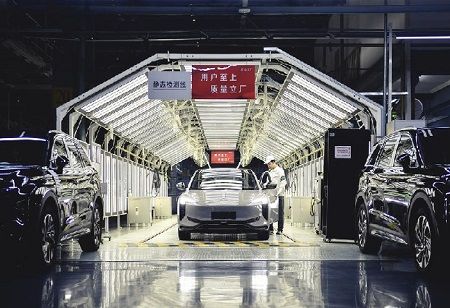In the dynamic workshop of Hongqi, a renowned sedan brand in China, located in Changchun, the capital of Jilin Province in the northeast, a breakthrough was achieved: the rear floorboard of an EH7 model was crafted seamlessly using a single die-casting process. This innovative technique has significantly enhanced the efficiency of car body production for Hongqi, also known as "red flag," a marque under the esteemed FAW Group Co., Ltd., increasing it by more than threefold.
This advancement in die-casting technology arises from a collaborative effort between the automaker and leading higher education institutions in the province, including Jilin University and the Changchun Institute of Optics, Fine Mechanics, and Physics, affiliated with the Chinese Academy of Sciences. Two decades after the initiation of China's revitalization strategy for the northeast region, the provinces of Heilongjiang, Jilin, and Liaoning are poised to embark on a fresh endeavor focused on elevating quality development, with significant backing from academic establishments.
Home to over 250 higher education institutions, the country's northeastern region boasts a dozen or so elite universities that have consistently contributed to national strategies and regional revitalization, ranging from China's first nuclear submarine and recoverable satellite to the Long March carrier rocket series and the self-developed large passenger aircraft C919.
In a new endeavor, provincial education departments have teamed up with their science and technology counterparts to create a platform facilitating collaboration between academic experts and industries. The goal is to translate research discoveries into practical products. As a result of the platform, in 2023, a seed fund of 10 million yuan (approximately 1.41 million U.S. dollars) and factory workshops spanning 3,300 square meters were designated in Jilin to facilitate the commercialization of a smart chassis technique capable of enabling lateral movement or spin turns for vehicles.
According to Jin Liqiang, a professor of automotive engineering at Jilin University, the technique was developed as early as 2017 but had remained on the cusp of commercialization. In 2023, universities in Jilin undertook nearly 1,300 projects related to the application and services of research results, culminating in the signing of over 450 technology transfer contracts. Heilongjiang Province backed 150 significant research initiatives, spurring enterprises to invest 526 million yuan in R&D.
Meanwhile, universities in Liaoning completed the commercialization of over 7,600 scientific and technological research results, with contract value reaching nearly 4.03 billion yuan. Furthermore, professors and doctoral students were organized to visit enterprises and offer "one-on-one" technical advice and consultation.
Shi Zhaohui, a representative from Heilongjiang's department of science and technology, noted that these partnerships can address obstacles impeding the commercialization of scientific and technological breakthroughs, resulting in significant economic and social gains. In the last five years, the Harbin Institute of Technology (HIT) has partnered with the Beidahuang Group to apply diverse AI technologies to the region's fertile black soil. These technologies encompass remote sensing, pest and disease detection, and weed identification, all aimed at realizing automated farming practices.
"We have been continuously promoting the interdisciplinary studies between agriculture and industry, deepening research and application of big data and AI, and fostering agricultural development", said Jin Jing, deputy director of the HIT Institute for Artificial Intelligence.

